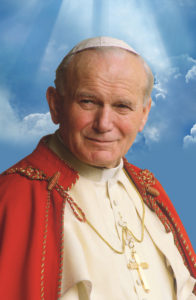We are all aware of how much the percentage of Catholics (and other Christians) keeping holy the Lord’s Day through church attendance has plummeted in the last fifty years. Another aspect of honoring the Third Commandment has also been jettisoned in modern times, even by many who attend Sunday Mass and strive to live according to their faith.
For there is no question that many Catholics and other Christians nowadays, at least in the United States, do not pay much attention to the importance of resting on this day. In the book of Genesis, we read that God made the world in six days and rested on the seventh, after seeing that all that he had created was good. The work of creation continues, with man as a coworker, and God means us to honor his example not only in the working but in the resting, interrupting the rhythm of our labors.
St. John Paul II’s apostolic letter on the Lord’s Day, Dies Domini, sets the foundation for understanding the meaning of Sunday for Christians. He emphasizes man’s creaturely dependence on God for everything and affirms the fact that everything belongs to God, even time.
In the Old Testament, the Ten Commandments included one admonishing us to remember the Sabbath – the seventh day, on which God rested from all his work and found it good, a “contemplative” resting as St. John Paul puts it.
In the New Testament, the meaning of the Sabbath has been transferred to Sunday because, “in the weekly reckoning of time Sunday recalls the day of Christ’s Resurrection. It is Easter which returns week-by-week, celebrating Christ’s victory over sin and death, the fulfillment in him of the first creation and the dawn of ‘the new creation’ (cf. 2 Cor 5:17). It is the day which recalls in grateful adoration the world’s first day and looks forward in active hope to ‘the last day,’ when Christ will come in glory.
The spiritual meaning of the Sabbath is thus realized in the Resurrection of our Lord on Easter Sunday. Today, as Dies Domini acknowledges, the special character of Sunday has been swamped by the purely secular character of the weekend: “Unfortunately, when Sunday loses its fundamental meaning and becomes merely part of a ‘weekend,’ it can happen that people stay locked within a horizon so limited that they can no longer see ‘the heavens.’”
St. John Paul explains at length the special need for the regular communal worship of the Church on Sunday through meditating on the mystery of Communion and of the mystical body of Christ:
Those who have received the grace of baptism are not saved as individuals alone, but as members of the Mystical Body, having become part of the People of God. It is important therefore that they come together to express fully the very identity of the Church, the ekklesia, the assembly called together by the Risen Lord who offered his life “to reunite the scattered children of God.”
Lest we forget, Sunday is also meant to be a day of joyful rest in solidarity. We need regular rest from work that goes beyond staring at video games or television sets or aimlessly wandering through malls. Families in particular should strive to spend some at least of this day in activities that will help nourish and refresh them through the coming week, such as spending time in nature. St. John Paul exhorts us:
In order that rest may not degenerate into emptiness or boredom, it must offer spiritual enrichment, greater freedom, opportunities for contemplation and fraternal communion. Therefore, among the forms of culture and entertainment which society offers, the faithful should choose those which are most in keeping with a life lived in obedience to the precepts of the Gospel. . . .Sunday should also give the faithful an opportunity to devote themselves to works of mercy, charity, and apostolate.
Those of you who are parents have a responsibility to help your children, even your grandchildren, to see the importance of Sunday as an opportunity to enjoy family life. Keeping holy the Lord’s Day is not only an obligation but also a need. As we thank Christ for liberating us from sin, we should remember that everything belongs to God, including our time.
St. John Paul’s concluding paragraph of Dies Domini sums up the meaning of Sunday in this way:
As the weekly “solemnity,” Sunday will continue to shape the time of the Church’s pilgrimage, until that Sunday which will know no evening. Therefore, dear Brother Bishops and Priests, I urge you to work tirelessly with the faithful to ensure that the value of this sacred day is understood and lived ever more deeply. This will bear rich fruit in Christian communities, and will not fail to have a positive influence on civil society as a whole.
We thank our God for giving us life and a world full of wonders to live in, liberating us from sin and opening up to us the doors of salvation. And one way of thanking him is to remember that everything belongs to God, including our time.















